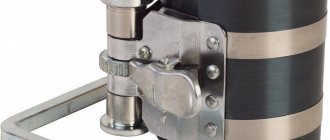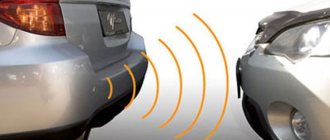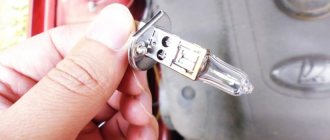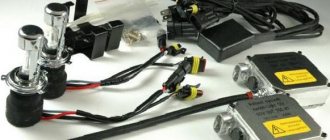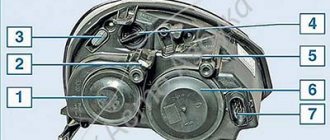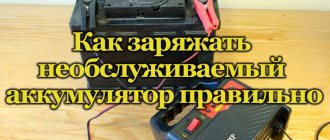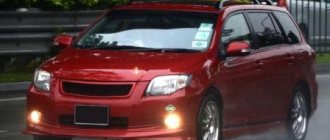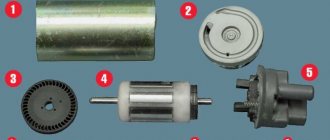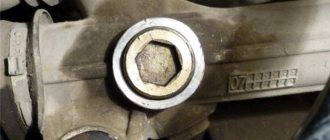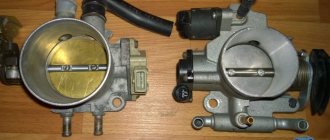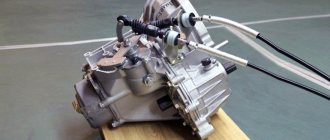The presence of fog lights (FFL) allows you to qualitatively improve road lighting in poor visibility conditions (rain, fog, high air humidity, etc.). Also correctly configured PTFs:
- paired with a head light, they better illuminate the road in the immediate vicinity in front of the car;
- fog lamps additionally illuminate the roadside, etc.
Taking into account such features, many motorists install PTF on cars in case of their absence. Moreover, owners often install xenon in their fog lights instead of halogen. At the same time, it is important to take into account a number of nuances when installing xenon in PTF. Read more in our article.
Is xenon legal in PTF in 2022?
Just like in the previous material, here we will turn to the main Technical Regulations of all motorists for help. Although there is no direct reference to it in the traffic rules, it only contains the rules for installing xenon in fog lights. But let's take it in order!
We must know and follow the traffic rules. Clause 3.4 of the Basic Provisions for the admission of a vehicle to operation tells us that:
3.4. Light fixtures do not have lenses or use lenses and lamps that do not match the type of light fixture.
And in this case, such cars are not allowed on the road.
But the types of lighting devices, including fog lamps, and lamps corresponding to them are determined by the above Technical Regulations.
1.3.8. The markings of high and low beam and fog headlights and the classes of light sources installed in them must correspond.
All external lighting devices, which include fog lights that allow the installation of xenon in them, are of a type whose abbreviation begins with the letter “D”. On the other hand, almost no type of fog light that does not have xenon installed from the factory starts with it. The only exceptions are the old “Japanese” and the Audi Q7 of stale generations.
This means that xenon in fog lights is not provided as standard for almost any PTFs that are not equipped with gas-discharge lamps from the factory. And you can’t install it in them.
Responsibility
If a motorist violates the rules and installs xenon in headlights that are not suitable for this, he may face punishment. Requirements for the technical condition of the car are very important, since the safety of other road users depends on it. Therefore, the punishment for such an offense will be quite serious - deprivation of rights for up to a year, while incorrectly installed lamps will be confiscated from the car owner.
Do you need headlight washers and auto-corrector for xenon?
The second point is the mandatory presence of an auto-corrector and a headlight cleaner for xenon. However, the point here is not the xenon itself, but the power of the luminous flux, which for almost any xenon lamps is more than 2,000 lumens. This number is the limit of what is permissible without auto corrector and headlight washers.
But the main thing here is that it makes no difference whether xenon is in the fog lights or in a regular head light with that amount of luminous flux. The Technical Regulations separately list fog lights with xenon:
1.3.7. Adaptive front lighting systems that perform the function of low beam, regardless of the light source used, low beam headlights with light sources of the LED class, as well as low beam and fog headlights TR CU 018/2011 164 with light sources of any class having a nominal luminous flux of more than 2000 lumens, must be equipped with an automatic headlight leveling device.
And the most interesting thing is described in the note to paragraph 1.3.7 of the Technical Regulations:
Note: Replacement HID light sources in categories D1R, D2R, D3R, D4R, D1S, D2S, D3S, D4S and halogen incandescent lamps in categories H9, H9B, HIR1 have a luminous flux rating greater than 2000 lumens.
Under what conditions are auto-corrector and washer not needed?
But there is still a small number of types of gas-discharge lamps, which sometimes have a luminous flux power of less than 2,000 lumens. They do not require PTF washer and auto corrector.
Such lamps include, for example, types D8S and D6S. In general, lamps rated less than 25 watts often (but not always) produce less than 2,000 lumens.
However, the disadvantage of such lamps is that if you set out to increase visibility from fog lights with xenon, then it is practically impossible to achieve this with lamps with a power of 25 watts or less - they do not shine.
Selection of lamps and their color temperature
For xenon lamps installed in fog lights, the main parameter is color temperature. It should not be more than 4300 K. This value corresponds to the yellow color. It is this kind of light that best penetrates fog and prevents the appearance of the “wall of light” effect.
And also when choosing a light source, look at the type of base. If you don't know what type of socket is installed in your car, unscrew the light bulb and compare it with photographs of xenon light sources that can be found on the Internet. You can also take it to a store that sells such lamps. Most often, European automakers use the H3 base in the PTF, and the Asian ones use the H11 base. You can also find fog lights with a base H1, H27 or H8. There are also other types of lamps.
It is better to take a thin ignition unit in a “slim” body. It is easier to install and maintain.
Why is xenon in fog lights useless?
To begin with, xenon should always be in lenses that focus the light beam in one direction. The main advantage of the fog headlights we are considering is their light dispersion. Yes, xenon in the PTF can be installed without lenses so that it scatters the light, but this will not help either, and below you will find out why.
Light from halogen lamps from foglights is scattered downwards, while xenon is scattered in all sorts of directions, which are not limited to its shadow frames. The problem is that in the case of xenon, due to its physical characteristics, it is impossible to set the upper limit of the direction of the light beam, but in PTF it is the clear location of this boundary that ensures visibility in the fog due to the fact that it does not blind the driver. In the case of xenon fog lights, in heavy fog you will simply see a white wall in front of you.
However, we must pay tribute - in light fog or cloudy weather, xenon with a yellow beam of light in some cases illuminates the road better than halogen lamps in just such headlights.
That is why today, 2022, many automakers that install xenon in fog lights from the factory stop even calling these headlights fog lights, but call them “additional headlights.”
And in any case, almost every “happy” owner of home-made xenon fog lights is almost guaranteed to be subjected to regular curses from oncoming cars. After all, gas-discharge lamps in such a light source, trying to scatter the light, dazzle much more than low-beam headlights.
Preparing to install fog lights
Before purchasing a xenon kit, determine whether the standard headlights are suitable for installing gas discharge lamps. If they are intended for halogen lamps or there are no PTFs at all, then buy lensed fog lights. Such devices produce a balanced flow of light and do not require complex installation and adjustment work. If standard PTFs are suitable for installing xenon, then you should select a set of lamps, ignition units, and wires. The optimal glow temperature is 4300K - white light with a lemon tint. If you prefer a white glow, then pay attention to elements marked 5000K.
The electrical circuit for connecting xenon to fog lights is almost identical to connecting halogen lamps. The main difference is the need for the location of the ignition units. A visual diagram in the image below.
Fine or imprisonment for xenon in fog lights?
In the context of the punishment for xenon light in the PTF, everything is similar to the ban on it in head lights. As we mentioned above, legislation often does not directly separate PTFs and headlights, and the Administrative Code is no exception. It provides for punishment for non-compliance with the Basic Provisions of the Traffic Regulations, paragraph 3.4 of which we cited above.
But what punishment is provided for xenon in fog lights: a fine or deprivation of rights? The question is ambiguous, because on the road you may well be deprived of your license in almost 90 percent or more of cases. Moreover, even in higher courts. You can be left without a license for xenon for a total period of time from six months to 1 year for violating the correct color of the light emitted by the headlights and their operating mode, the Basic Provisions of the Rules (Part 3 of Article 12.5 of the Administrative Code). And this is also why fog lights will be confiscated.
But why are we talking only about practice?! Because in theory, neither the color of the headlights when installing xenon in foglights (if it is white, yellow or orange), nor even their operating mode is affected. According to the Technical Regulations, there are only two modes:
- constant,
- flashing
If your xenon lights do not blink, then the mode is also not broken. And it should also be taken into account that in order to form a criminal offense for such an offense, both conditions must be met.
The legal punishment (unfortunately, in most cases only in theory) is a fine of 500 rubles under Part 1 of the same article, which provides for any violations of the Basic Provisions of Traffic Regulations, with the exception of exceptions (listed in the following parts of this article of the Administrative Code).
Cancellation (termination) of registration for xenon in PTF
Separately, a very important point should be noted - the cancellation of registration for the installation of xenon xenons in the PTF. This is quite possible, including in practice. The fact is that vehicles whose design has been amended are not subject to registration (clause 3 of Order No. 399).
At the same time, a paragraph of the same Order prescribes that in the event of violations identified in already registered cars, in the form of changes to the design, the registration of such cars is subject to termination (cancellation) until the reasons for cancellation are eliminated.
Something else useful for you:
- Is it possible to install FSO flash headlights for long-range driving? What is the fine and are they deprived of their rights?
- When is it possible and not to use fog lights according to traffic regulations?
- Is it possible to install a chandelier headlight on the roof of a car and make it legal? What's the fine?
If you install xenon in fog lights of a type that is not suitable for gas discharge, you are making a change to the design of the vehicle and are required to formally register such a change (but you will not be able to, since such a car will not pass safety certification).
In addition, when installing xenon in PTFs that do not provide for its installation, part of the electrical wiring almost always changes, because xenon requires more powerful wires, and this, alas, also changes the design of the car.
Recommendations
By installing xenon on the car, fog lights can also be “upgraded” if necessary
However, it is important to remember that increasing the brightness of the glow will require the owner not only to follow all the recommendations discussed above, but also to more carefully adjust the optics. Also, during operation, the auto adjustments of the head optics and PTF must be checked on a special stand or periodically adjusted the light with your own hands.
An equally important criterion is the choice of the color of the xenon lamps. At the same time, yellow colors are best suited for PTF, but do not combine well in terms of appearance with xenon in the headlights. At the same time, white and blue xenon improve the appearance of the car, but illuminate the road noticeably worse in fog, rain or snow.
When it comes to installation, many unskilled installers try to place the ignition units closer to the headlights. In the case of PTF, this cannot be done, since the fogs are located close to the road, constantly suffering from moisture. For this reason, you need to select long wires in advance in order to place the blocks away from the fogs.
Also, when purchasing xenon PTF, it is better to choose kits with thin ignition blocks (slim block). Adjusted for the lower power of the foglight, xenon will work quite normally with a thin block. Such ballast is easier to install under the hood, especially considering the presence of two more ignition units for headlights. At the same time, experienced car enthusiasts usually install blocks for headlights of a standard size.
Under what traffic regulations can fog lights be turned on?
For reference, section 19 of the traffic rules prescribes certain conditions when you can drive (or stand) with the fog lights on. Such cases include:
- dark time, but only together with near or distant lights and exclusively on unlit roads,
- stopping or parking on unlit roads in the dark or in cloudy/foggy weather,
- driving in cloudy weather or fog (exclusively with low or high beams),
- use as an alternative to low beam headlights or instead of daytime running lights during daylight hours.
Is it worth using?
Each driver must answer the question of whether to install xenon or not, taking into account all the pros and cons of gas-discharge lamps. If we briefly systematize all the features of these lighting devices, we get the following picture:
| Advantages | Flaws |
| Luminous flux power (about 2-3 times stronger than halogen lamps) | Luminous flux power. In some situations, increased brightness may be excessive and may blind oncoming drivers. Correct installation and adjustment of headlights in theory eliminates this problem, but in practice this does not always help. |
| Variety of light spectrum (you can choose the color that will cause the least amount of eye fatigue for the driver) | Price (equipment from trusted companies is not cheap, and, in addition, if one of the lamps fails, it is recommended to change both due to the strong contrast in the color difference) |
| Durability (service life is on average 3-5 times longer than halogen lamps) | |
| Low energy consumption |
